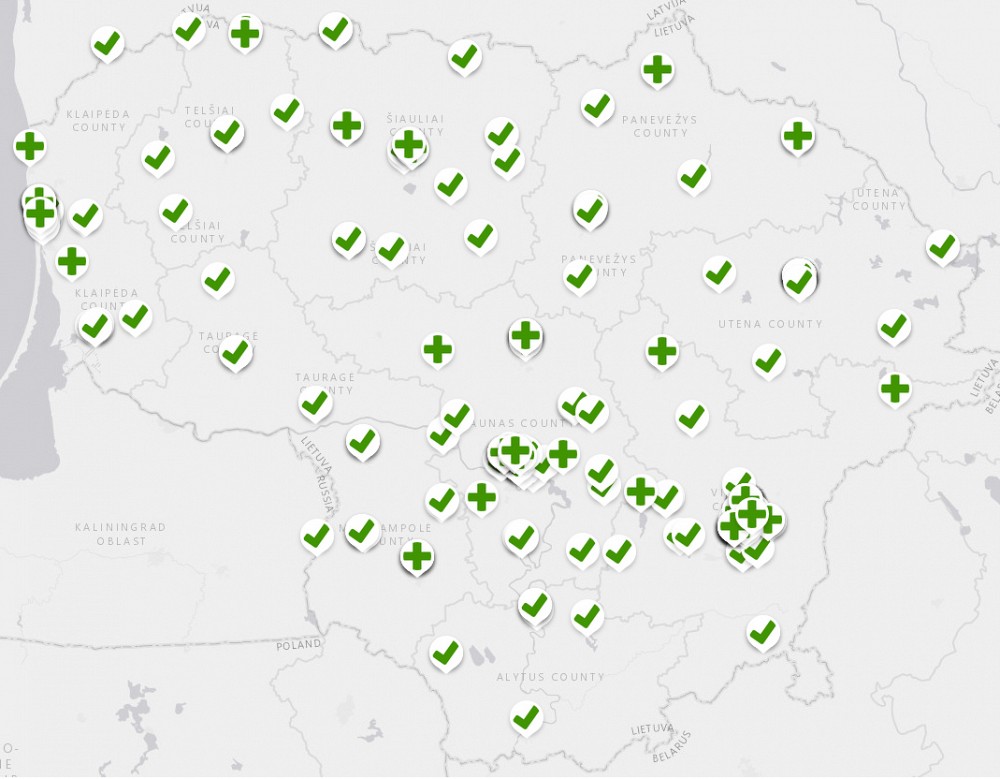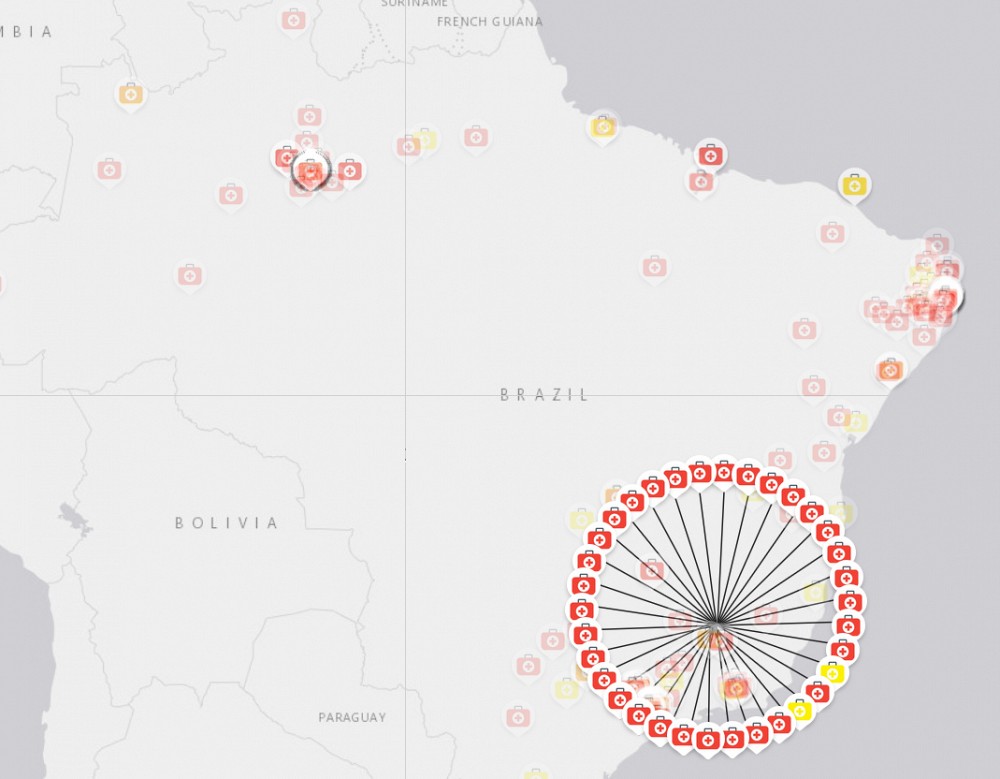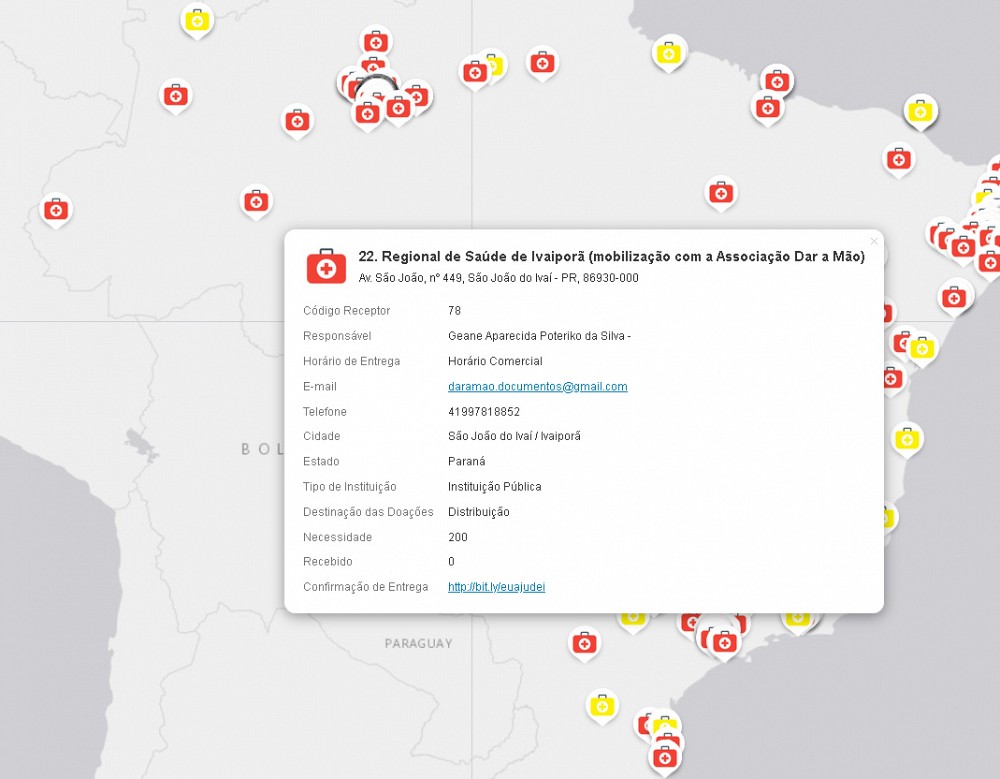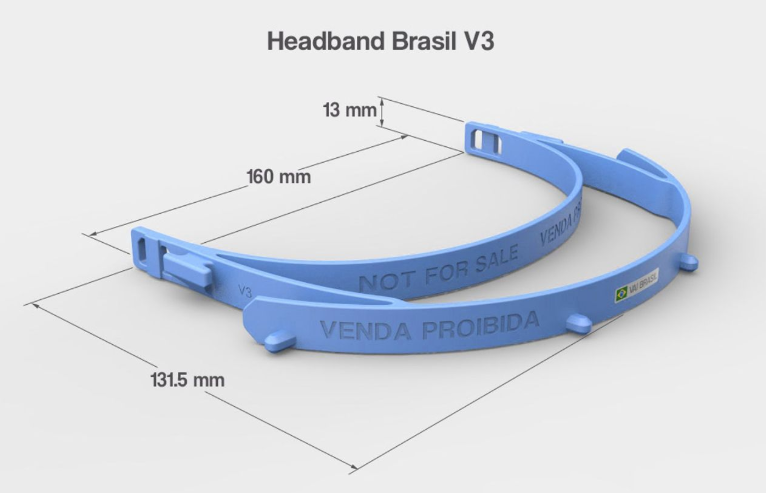Pagalbos Žemėlapis
August 19, 2020
Originally posted on enablingthefuture.org by Ben Rubin.
In the shadows of his lab, Mažvydas Sverdiolas at first appears subdued. It is 2am in Lithuania, a time that has often marked the beginning of his nights. Mažvydas has been keeping himself busy these last days and catching his breath just as a marathon runner might shift from training to recovery after a marathon. He shares a recent project; a 3D printed mask made in the shape of a grimacing jawbone, inspired from the last Mad Max film. He has been using this mask for getting groceries, which I imagine is a clever way to encourage people to keep 6 feet of space while waiting in line. It is also this mask that he chose while accepting an award from the Mobilization and Civil Resistance Department of the Ministry of National Defence. It's a good sign to see his sense of humor is recuperating.

Mažvydas and his fiance Urtė accepting awards from the Mobilization and
Civil Resistance Department of Lithuanian Ministry of National Defence.
Mažvydas Sverdiolas is no stranger to global efforts. From their home in Vilnius, he and his fiance Urtė saw a need in the region and founded e-NABLE Lithuania in 2018, the first and only chapter in Europe's Baltic states. Since then, Mažvydas has contributed to many community resources for the e-NABLE Hub: including our Video Room, the Chapter Map, and a Device Color Customizer. He had just imported a complete archive of posts from the past into the Hub when the virus hit.
Across the ocean, e-NABLE Brasil Chapter leader Everton Lins saw a need and an opportunity. He reached out to Mažvydas to create a map similar to the e-NABLE Chapter map for medical personnel to request personal protection equipment (PPE) for Brazilian hospitals. Mažvydas responded that evening, working through the night with Everton to complete the map and host it on his servers. He also created a map for Lithuania. That was three months ago. Since then, Mažvydas found himself responsible for managing the distribution of face shields for Lithuania's entire public healthcare system, and Everton has delivered over 100,000 masks all across Brazil.
In Lithuania, Mažvydas's system was designed to cover the essentials; unmet needs of public hospitals and clinics. Requests from private institutions and individuals were declined; public health professionals were urged to request the bare minimum to cover their basic needs and those of their colleagues. The product offered was simple. The Prusa face shield from Czech Republic was open-source and easy to print in the filaments that were available. In the spirit of e-NABLE, it was to be delivered, by volunteers, for free.
Mažvydas shared a post with some local maker groups. The post was shared thousands of times. Requests began pouring in.
With almost 500 requests, the project has provided 14,474 visors to almost every public hospital in Lithuania. Every request was fulfilled.
Mažvydas began sourcing materials with his own funds. After accidentally over-purchasing plastic sheets for the visor, he asked several friends and local makers to help print frames. Word spread and new volunteers stepped up. A local company agreed to contribute an endless supply of transparent PETA rolls used for visors free of charge. Laser cutting, die cutting, and elastic were offered from others. A friend with an online furniture business volunteered his trucks to provide next day deliveries of materials to makers all around the country. Armed with supplies, volunteers covered the 3D printing, assembly, sterilization, and final deliveries to their local hospitals. A Facebook group, a spreadsheet, and a map coordinated over 300 people to support their country.
 Although the project began as a continuous 24-hours effort intended to provide a temporary stopgap solution, it gradually became clear that this was going to be one of the country's best solutions for face masks. Borders were closed, and public institutions couldn't afford the inflated costs of PPE. While coordinating makers and deliveries, Mažvydas was overwhelmed by reports from desperate medics as almost every hospital in Lithuania ran out of supplies.
Although the project began as a continuous 24-hours effort intended to provide a temporary stopgap solution, it gradually became clear that this was going to be one of the country's best solutions for face masks. Borders were closed, and public institutions couldn't afford the inflated costs of PPE. While coordinating makers and deliveries, Mažvydas was overwhelmed by reports from desperate medics as almost every hospital in Lithuania ran out of supplies.
Last week, after a 2 month marathon, the team reached the finish line. From almost 500 requests, the project has provided 14,474 visors to almost every public hospital in the country. Every request was fulfilled, entirely via donated goods and services; no money exchanged. A well-defined mission accomplished!
Meanwhile in Brazil
While the covid crisis has died down in Lithuania, it is still raging in Brazil on a different scale, a country 100 times larger and 130 times as populous. They have also experienced a COVID mortality rate that is 10 times worse: Brazil is reporting upwards of 50,000 COVID-19 deaths; Lithuania under 100.
e-NABLE Brasil Official Design thanks to Peter M of California, who created specific designs to meet the needs of several specific regions around the world.
Everton continues to soldier on. His team has adapted Prusa-style face shields to public hospitals and essential service agencies free of charge. e-NABLE Brasil has helped volunteers create and deliver devices following safety guidelines. Within days of publishing the Brazilian map, thousands of face shields were delivered, while tens of thousands of requests kept coming in. Everton estimates that 15,000 3D printed devices have been donated by volunteers so far. To keep up with demand, the team injection molded another 80,000 shields. More than 70,000 requests remain. In the coming weeks, the team will be transforming 1.8 tons of raw polypropylene donated by 3M into face shields to create another 50,000 devices for free distribution.
Similar to Mažvydas and the team in Lithuania, e-NABLE Brasil has stepped around many of the liability obstacles by allowing medical teams to make requests for themselves.
To reduce contact and avoid contagion between patients, doctors, and the public during the donation process, his team is developing a secure app connecting those in need to a network of Brazilian medical professionals. Using automatic authentication, they will manage appointments, sensitive medical information, and even devices for recipients. As an open source project, it will be usable by other chapters. e-NABLE Brasil is passing the torch back to the community.
Everton, Mažvydas, and the volunteers they helped organize are true heroes. By extending the e-NABLE recipe (a blend of free open-source efforts created by volunteers to address unmet needs) they have taken the step from 3D-printed prosthetics to personal protective equipment to online tools and become national leaders, role models, and rays of hope in a dark time.
Two chapters, two hemispheres; a singular vision for enabling a better future. How far can we go?










